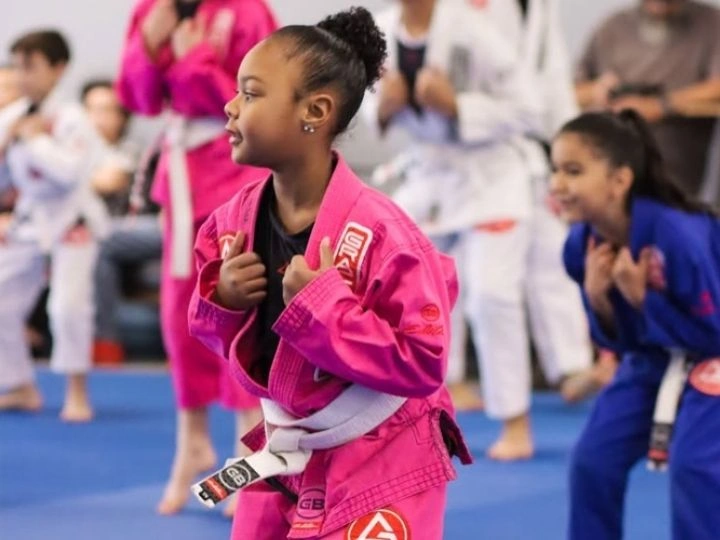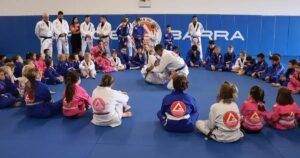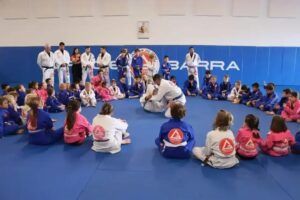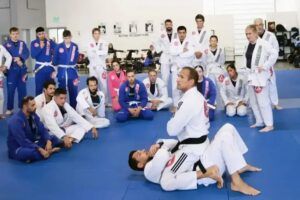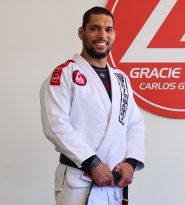Hi, I’m Professor Seidler Rodrigo, Head Professor at Gracie Barra Riverton. Over the years, I’ve spoken to hundreds of parents who were trying to find the perfect martial arts school for their kids. Some felt overwhelmed by the options. Others weren’t sure what to look for or what questions to ask. And some simply didn’t know what truly matters when it comes to creating a safe, positive, and effective learning experience for children.
If you’re a parent searching for a Brazilian Jiu-Jitsu (BJJ) school for your child, don’t worry, before being a Jiu-Jitsu instructor, I’m also a father. I want to help, as I understand how important this decision is. It’s about more than martial arts. A wrong choice can affect your child’s confidence, safety, and personal development.
So here’s what you really need to pay attention to when choosing a Jiu-Jitsu school for your little one.
1. A Structured, Age-Specific Curriculum
Not all martial arts schools are created equal, and not all of them teach kids in a way that’s appropriate for their age or stage of development. A solid BJJ school should follow a structured and well-tested curriculum that separates age groups (like 3–5, 6–9, and 10–13) and introduces techniques in a progressive, easy-to-follow manner.
At Gracie Barra Riverton, our Jiu-Jitsu classes follow the Gracie Barra Kids program that is built to help kids learn discipline, body control, coordination, and focus, using a proven curriculum developed by Master Carlos Gracie Jr over the last 3 decades and used in over 1,000 Gracie Barra schools around the world. Each of our kids’ Jiu-Jitsu classes is designed with their emotional and physical development in mind.
What to Ask:
- Do you have separate classes for different age groups?
- Is there a set curriculum, or are classes improvised?
2. Certified Instructors Who Know How to Teach Kids
Being a great black belt doesn’t automatically make someone great with children. Teaching kids requires patience, communication, empathy, and structure.
Parents should always look for instructors who are not only certified but also specifically trained to teach youth. At our academy, every coach who works with kids undergoes background checks and receives ongoing education in both Jiu-Jitsu and child development.
What to Ask:
- Are your instructors certified to teach children?
- What experience do they have working with kids?
3. A Safe, Clean, and Welcoming Environment
You can tell a lot about a Jiu-Jitsu school by how it feels the moment you walk in. Is the space clean and well-maintained? Are the mats sanitized daily? Do the staff greet you with a smile?
Your child should feel safe, welcomed, and respected from day one. That’s non-negotiable.
At Gracie Barra Riverton, we take pride in our family-friendly atmosphere. We keep our mats and facilities spotless and enforce a strong culture of respect, kindness, and safety both on and off the mats.
What to Look For:
- Clean facilities and equipment
- Friendly, attentive staff
- Clearly posted rules and expectations
4. A Focus on Character Development, Not Just Competition
Some schools put all their focus on winning tournaments. While competition can be valuable, it should never come at the expense of core values like respect, discipline, and teamwork.
Jiu-Jitsu is a powerful tool for shaping character. The right school will use every class as a chance to build your child’s confidence, humility, perseverance, and self-control.
What to Ask:
- How do you balance competition and personal growth?
- What values do you teach in your kids’ program?
5. Proper Student Pairing and Class Size
A great school understands that pairing matters. Kids should train with partners who are similar in size, age, and skill level. This prevents injuries and creates a more comfortable learning environment.
Class size also matters. Overcrowded classes make it difficult for instructors to give kids the attention they need. A lower student-to-instructor ratio usually means a better, safer experience.
What to Ask:
- How do you pair students during training?
- What is your average student-to-instructor ratio?
6. A Strong Community That Includes Parents
Jiu-Jitsu isn’t just an activity your child attends; it’s a community. The best schools make parents feel welcome and informed. They keep communication open, celebrate student progress, and create events that bring families together.
At Gracie Barra Riverton, we believe parents are our partners. We update you regularly on your child’s progress, and you’re always welcome to watch, participate, and be part of the journey.
What to Look For:
- Open lines of communication
- A family-friendly vibe
- Opportunities for parents to engage
7. A Trial Class That Feels Like a Warm Welcome
Any martial arts school worth your time should offer a free trial class so your child can experience the environment before you commit. But more than that, the trial should feel like a warm welcome, not a sales pitch.
We always invite parents to stay, watch, and ask questions. We also make sure the child is introduced to the instructor and classmates ahead of time to ease any anxiety.
What to Expect:
- A smooth, friendly introduction process
- Real engagement with your child
- Complete information on next steps
Final Thoughts from Professor Seidler Rodrigo
Choosing a Jiu-Jitsu school for your child isn’t just about location or price. It’s about finding a place where your child will feel safe, seen, and supported. A place that teaches more than techniques, a place that builds character, community, and confidence.
If you’re in the Riverton area, I personally invite you to schedule a free trial class with us here at Gracie Barra. Come meet our team, tour the facility, and let your child experience the energy and encouragement we offer every day.
We’re not just teaching Jiu-Jitsu. We’re helping kids become stronger, more disciplined, and more confident, one class at a time.
I look forward to welcoming you to our mats.

